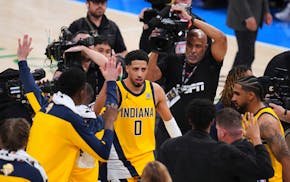The Minneapolis Park Board will again try to pass a plan to revamp the 18-hole Hiawatha Golf Course into a nine-hole course.
The transformation would ostensibly reduce the need for the board to pump enormous amounts of groundwater from the constantly flooding grounds, but it would also fundamentally change a historically significant facility where Black golfers have played for generations.
Park commissioners tried but failed to pass the $43 million staff-recommended proposal in April after six years of planning and an emotional public engagement process.
On Wednesday, the Planning Committee brought the plan back, including several amendments previously authored by Commissioner LaTrisha Vetaw to create golf management internships and jobs for youth.
Commissioner Kale Severson, who does not serve on the planning committee, urged his colleagues to reject the proposal and start over. He argued that golf revenues were up amid the pandemic, and that cutting the number of holes would tamp down the Park Board's income during a golf renaissance.
While golf did make money in 2020, expenses usually outpace revenues. The Park Board's golf courses have collectively lost more than $10 million over the past 10 years, including the $1.3 million net gain of 2020.
Despite Severson's objections, the resolution passed with Commissioners Steffanie Musich, Meg Forney and Chris Meyer voting for it, while Commissioners Londel French and Vetaw voted against.
Vetaw said in an interview that she needed time to explain to her constituents how resolutions can always be brought back for reconsideration, even after they're voted down. She said she hoped members of the Black community would view her amendments as compromises they "can feel good about."
"As a Black woman I know how people feel like something is being taken from them," she said. "But then I also get this is an environmental problem and houses are flooding, and the poorest people in that neighborhood ... are going to be the first ones to flood if something goes bad over there."
The planning committee also voted Wednesday on another Vetaw proposal to rename the Hiawatha Golf Course clubhouse after Solomon Hughes Sr., the local golf legend who integrated the PGA and St. Paul Open during the era of segregation and achieved two holes-in-one on Hiawatha's eighth hole.
Hiawatha Golf Course was built in a flood plain below the level of Lake Hiawatha and requires continual groundwater pumping to avoid going underwater — to the tune of 330 million gallons of water in 2020. With climatologists predicting precipitation will intensify with climate change, park staff advocated a course redesign that would channel floodwaters into the lake naturally.
State law requires DNR permitting to appropriate more than a million gallons of groundwater per year because excessive pumping can interfere with the water table, impacting nearby wells, wetlands and streams, said DNR water resources regional manager Dan Lais.
The DNR issued a permit for the Park Board to pump up to 308 million gallons a year, with some wiggle room, with the expectation that the board is working toward a permanent solution.
"That was a temporary measure that was going to be reduced, at least according to the current plan," Lais said.
The planning committee narrowly passed the nine-hole plan for the first time in February with the full board expected to also approve it on April 7 after Vetaw crafted her amendments to create jobs for youth and name the clubhouse after Hughes.
However, because that vote came during the trial of former police officer Derek Chauvin for the murder of George Floyd, Vetaw proposed postponing the issue until after the verdict in hopes of reducing stress on the Black community.
Commissioner Brad Bourn then countered with a motion to postpone the vote until after the exhaustion of all appeals processes, which could take decades.
Commissioners argued over whether political manipulation was drawing out the process.
"It's a plan that, while imperfect, honors the history of the space and the history of Black golf at that site, while also being realistic about the fact that we have a climate emergency and intense rain events," argued Board President Jono Cowgill, who supported the plan. "The shenanigans would be funny if it wasn't such an important issue."
French, who opposed the plan, agreed that a vote should not be delayed indefinitely: "The way it is over and over again, keeping this project in limbo, is not the best thing for this project."
Ultimately, the majority of commissioners present chose to proceed with a vote that night. The result was "yes" votes from Musich, Meyer, Cowgill and Forney and "no" votes from Severson and French. Bourn and Vetaw abstained and Commissioner AK Hassan was absent.
Immediately afterward, Bourn pointed out that despite majority support, the resolution failed because the board technically needed a supermajority, not a simple majority, to change the name of any real estate, making Vetaw's amendment to name the clubhouse after Hughes a complication.
Vetaw stated in an interview afterward that her intention was to honor Hughes, not scuttle the entire draft master plan.
Wednesday, the planning committee split the renaming proposal from the other amendments to be passed separately.
"It's nice to have a course within the city, within neighborhoods that are moderate income, where people can go to play golf," said Shirley J. Hughes, Solomon's daughter, who had petitioned Park Superintendent Al Bangoura to rename the clubhouse after her father. "I would hope that they could find a way, if they can't maintain it as an 18-hole, that they could as a nine-hole and somehow solve the water problem because it is a legacy golf course, or it certainly had been for African Americans."
Susan Du • 612-673-4028

Softball state tournament: Live updates from championship games at Jane Sage Cowles Stadium

Podcast: How the Pacers taught the Thunder (and the Wolves) a playoff lesson
Yuen: How success has pushed Minnesotans off sidelines in trans athlete debate
David Festa's return to Twins goes south in a hurry

![A golfer, who wished not to be identified, hits a tee shot on Hiawatha Golf Course, which was consumed by fog near dawn Tuesday in Minneapolis. ]](https://arc.stimg.co/startribunemedia/ORVMJ7FBNF2TLOKTC2Y5GRZFEM.jpg?w=600&h=600&auto=format%2Ccompress&cs=tinysrgb)